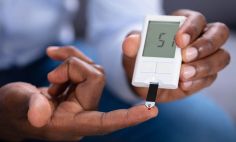Chris Davenport is only 18, but he understands how hard it can be to improve your health when you're also trying to deal with other tough challenges in your personal life.
Eighteen months ago, Chris was depressed. "I knew I had prediabetes, but my eating habits were bad and my motivation to take care of myself wasn't high," he says.
He knew he was at risk for type 2 diabetes, and was later diagnosed with the condition.
"There were warning signs, plus it runs in my family," he says. Chris also admits that he would skip meals and then overeat "greasy, unhealthy food."
Dealing with depression and anxiety made it harder for him to care about his health. "I wouldn't take medicine or eat to help myself. I wasn't active, and with my eating habits, it all made for a bad version of me."
Making changes
Today, all that has changed, and Chris is proud of his hard-won successes.
He is back in school, taking classes at a Washington, D.C., alternative high school. And his blood sugar levels are under control, thanks to regular, healthful meals and exercise.
Chris has frank, practical advice for others—of any age—who need to manage their diabetes.
"I know it sounds like a cliché, but, honestly, I had to learn that this is a process," he says. "You have to take it a day at a time. Once you get into the habit of doing the right thing each day, you won't remember the days you didn't want to do it."
Finding help through NIH
Chris says that things began to change for him when he started going to the diabetes clinic run by Stephanie Chung, M.B.B.S., at Children's National Hospital. During a physical, Chris's doctor recommended the clinic and put him in touch with Dr. Chung, who conducts research on type 2 diabetes funded by the National Institutes of Health (NIH).
"Once you get into the habit of doing the right thing each day, you won't remember the days you didn't want to do it."
- Chris Davenport
At the clinic, he began working with Dr. Chung, who also helped him enroll in a major NIH study of young people with diabetes.
Eventually, he says, "I just got tired of being depressed and decided to do something for myself."
Today, he typically eats special microwaveable prepared meals for breakfast, lunch, and dinner. They help him regulate his blood sugar levels. Breakfast, for example, might be an egg, ham, and cheese scramble with a side of blueberries and applesauce.
"They include nutrition facts on each meal, so I know how many good calories and bad calories, like carbs and fat, I've eaten," he explains.
Staying motivated
Chris also goes to the gym regularly, spending an hour on the treadmill, followed by weight lifting.
These changes, he says, "have given me more energy." They've also given him confidence and helped his optimistic attitude shine through.
When asked to name the biggest lesson he's learned in the past 18 months, Chris doesn't hesitate.
"The hardest thing about working at achieving something is just getting started," he says. "Once you understand that, you can feel more comfortable taking it slow, training your body to do it more."
"And even if you miss a day," he adds, "it will feel wrong, and you'll realize you just need to get back to doing what you need for your health."







